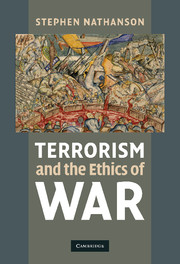Book contents
- Frontmatter
- Contents
- Acknowledgments
- Introduction
- PART I TERRORISM: WHAT'S IN A NAME?
- PART II WHY MORAL CONDEMNATIONS OF TERRORISM LACK CREDIBILITY
- PART III DEFENDING NONCOMBATANT IMMUNITY
- Introduction: the ethics of war-fighting: a spectrum of possible views
- 8 The realist challenge to the ethics of war
- 9 An ethic of war for reasonable realists
- 10 Walzer on noncombatant immunity as a human right
- 11 The supreme emergency exception
- 12 Rights theories, utilitarianism, and the killing of civilians
- 13 Immunity rights vs. the right of self-defense
- 14 A rule-utilitarian defense of noncombatant immunity
- 15 Why utilitarian criticisms of noncombatant immunity are mistaken
- 16 Is noncombatant immunity a “mere” convention?
- PART IV HOW MUCH IMMUNITY SHOULD NONCOMBATANTS HAVE?
- Conclusion: terrorism and the ethics of war
- Bibliography
- Index
10 - Walzer on noncombatant immunity as a human right
Published online by Cambridge University Press: 05 June 2012
- Frontmatter
- Contents
- Acknowledgments
- Introduction
- PART I TERRORISM: WHAT'S IN A NAME?
- PART II WHY MORAL CONDEMNATIONS OF TERRORISM LACK CREDIBILITY
- PART III DEFENDING NONCOMBATANT IMMUNITY
- Introduction: the ethics of war-fighting: a spectrum of possible views
- 8 The realist challenge to the ethics of war
- 9 An ethic of war for reasonable realists
- 10 Walzer on noncombatant immunity as a human right
- 11 The supreme emergency exception
- 12 Rights theories, utilitarianism, and the killing of civilians
- 13 Immunity rights vs. the right of self-defense
- 14 A rule-utilitarian defense of noncombatant immunity
- 15 Why utilitarian criticisms of noncombatant immunity are mistaken
- 16 Is noncombatant immunity a “mere” convention?
- PART IV HOW MUCH IMMUNITY SHOULD NONCOMBATANTS HAVE?
- Conclusion: terrorism and the ethics of war
- Bibliography
- Index
Summary
We generally assume that most people don't have to be convinced that other people – including those who are not citizens of our own country – matter morally. That is why the phrase “human rights” resonates so strongly. The belief that every person has some claim to decent treatment, no matter what society they belong to, is part of the humanitarian strand of commonsense morality, and I appealed to it in my effort to move reasonable realists from “anything goes” to proportionality as a criterion for justified acts of war.
My challenge now is to justify moving beyond proportionality to rules that explicitly recognize noncombatant immunity from deliberate attacks. Even if I succeed, there will still be questions about the strength of noncombatant immunity. Is it merely a weak presumption against attacking civilians that allows attacks when they yield some significant military value? Is it a stronger prohibition that permits attacks on civilians only in very extreme cases? Or, is noncombatant immunity an absolute prohibition that bars attacks on civilians under any circumstances?
WALZER ON NONCOMBATANT IMMUNITY
I will begin my discussion of these questions by considering Michael Walzer's treatment of them in Just and Unjust Wars. This is a good starting place because Walzer asks and answers both these questions and others that I discuss. One of Walzer's central goals in Just and Unjust Wars is to defend the principle of noncombatant immunity.
- Type
- Chapter
- Information
- Terrorism and the Ethics of War , pp. 133 - 145Publisher: Cambridge University PressPrint publication year: 2010



